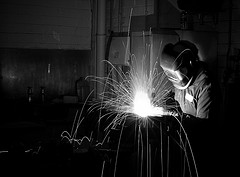The Essential Report Archive Read the latest report
-
manufacturing, Sydney, Tim Ayers
We Still Make Stuff
If you read the press, you’d think there isn’t a single manufacturing job in any place but China. Truth is, though, lots of stuff is made right in your backyard—it just takes a bit of paying attention. Tim Ayres helps us put on the glasses.
Ayres, the New South Wales secretary of the Australian Manufacturing Workers Union, runs it down in a cogent piece in the Daily Telegraph:
As trains and motorways are funneling commuters east, work is already under way at the thousands of small and medium-sized factories and workshops often hidden from view.
Near Liverpool, workers at HPM make the only Australian-made powerboards, sockets, smoke alarms and switches you’ll find at your local hardware store.
 At Minto, workers churn out Streets paddle pops and Cornettos. At Bella Vista, workers at ResMed make devices to treat sleep apnea.
At Minto, workers churn out Streets paddle pops and Cornettos. At Bella Vista, workers at ResMed make devices to treat sleep apnea.To be sure, jobs are being hit. But, I think Ayres’ spectacular point is that there has to be a strategy to develop manufacturing without taking it out of the pockets of workers:
We won’t get there on labour costs: we’re lucky to live in a country where people earn fair wages. It will be through investment in technology, innovation and skills; a commitment from industry to employ managers who are capable of leading their enterprises in a tough environment; and a serious effort from government.
Government’s role is not to prop up outdated technologies and industries. But it should be fighting for good local jobs, supporting the industries of the future and creating the environment for them to thrive.
Put another way, the easy and lazy way—and the way of The Coalition and its business allies—is the knee-jerk cut wages and benefits. But, that road is a road to destroying the middle class.
-
26 June 2012, 260612, Adelaide, city planning, Ken Morrison, Melbourne, PCA, Perth, Sydney
How do we put the mojo back into our cities?
Ken Morrison explains why people, place and ease are the ingredients which get cultural entrepreneurs thinking big in the city.
What set of ingredients turns a drab, pocket of town into a new must-go place?
For Melbourne, it was the economic decline of the 80s which saw Jeff Kennett relax liquor laws to allow small bar owners to take over empty city shops and laneways which gave the city its cultural vibe.
Others are following their footsteps: Sydney is seeing an emergence of small bars thanks to new licensing laws; Adelaide is building city centre apartments to bring the population back in and previously staid old Perth is thriving thanks to a laneway revitalisation program to cater for international guests who are in town for the mining boom.
The Property Council’s Ken Morrison of the Property Council of Australia tells 3Q it’s still up to city planners to follow through and get the funk back into town squares.